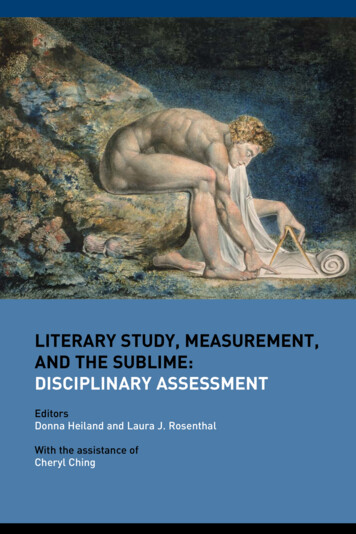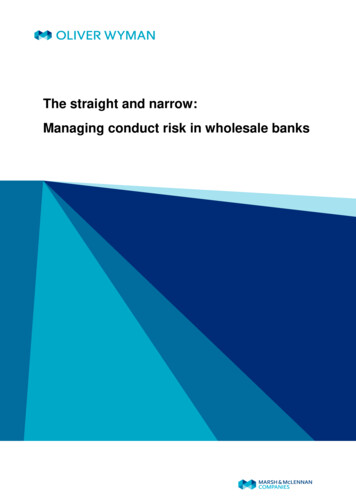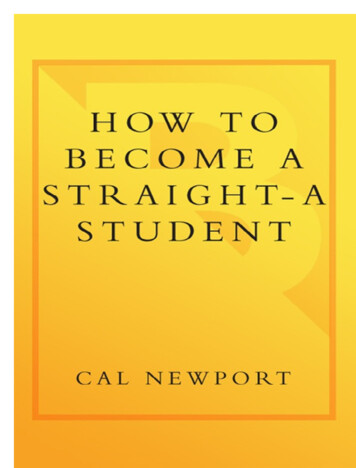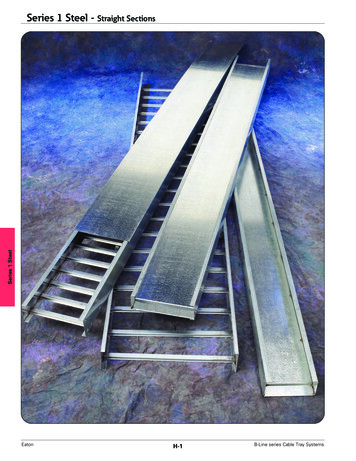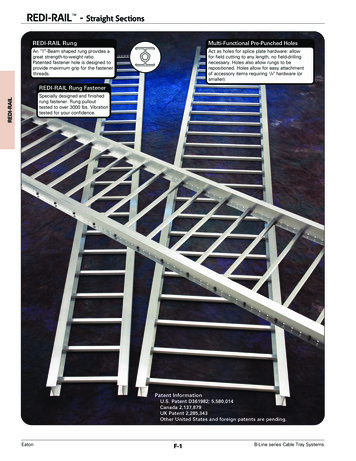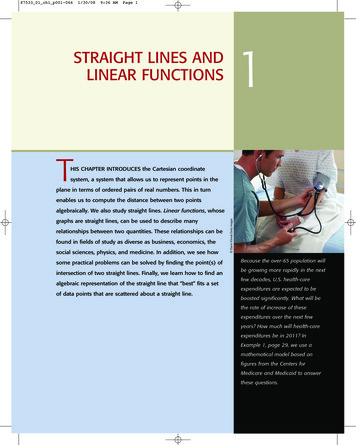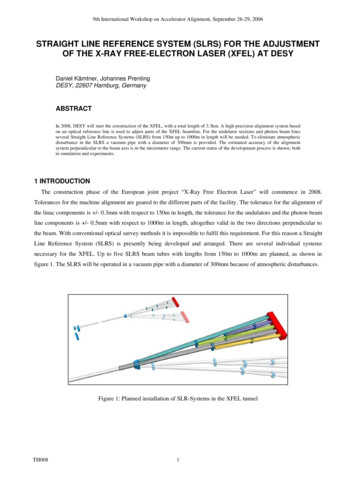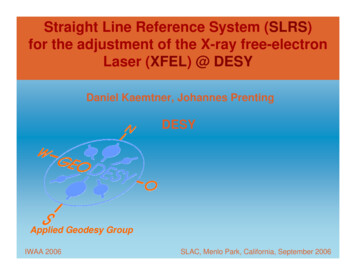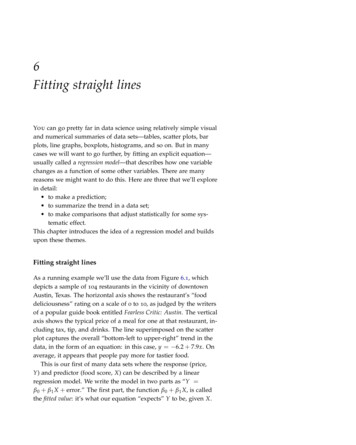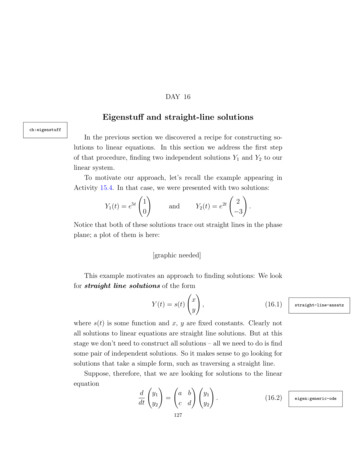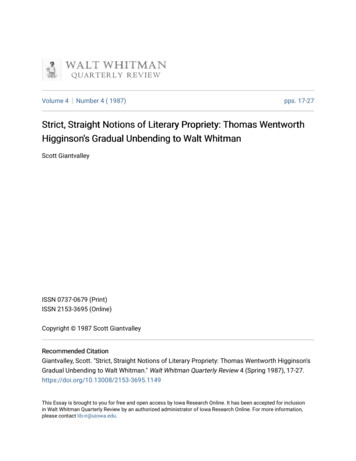
Transcription
Volume 4Number 4 ( 1987)pps. 17-27Strict, Straight Notions of Literary Propriety: Thomas WentworthHigginson's Gradual Unbending to Walt WhitmanScott GiantvalleyISSN 0737-0679 (Print)ISSN 2153-3695 (Online)Copyright 1987 Scott GiantvalleyRecommended CitationGiantvalley, Scott. "Strict, Straight Notions of Literary Propriety: Thomas Wentworth Higginson'sGradual Unbending to Walt Whitman." Walt Whitman Quarterly Review 4 (Spring 1987), 17-27.https://doi.org/10.13008/2153-3695.1149This Essay is brought to you for free and open access by Iowa Research Online. It has been accepted for inclusionin Walt Whitman Quarterly Review by an authorized administrator of Iowa Research Online. For more information,please contact lib-ir@uiowa.edu.
"STRICT, STRAIGHT NOTIONS OFLITERARY PROPRIETY":Thomas Wentworth Higginson's Gradual Unbendingto Walt WhitmanSCOTTGIANTVALLEYON 24 SEPTEMBE 1888, in one of his almost nightly conversations with hisfaithful amanuensIs Horace Traubel, Walt Whitman commented on some ofhis major detractors:"You know, Horace, there are some who in the natural order couldn't accept Walt Whitmancouldn't appreciate the inmost purpose of his art: it is the absence of affinities. Lowell, with hisalmost steel-like beauty, and Higginson, with his strict, straight, [sic] notions ofliterary propriety-I could call them enemies, creatures natively antipathetic."1Thomas Wentworth Higginson (1823-1911), critic, editor, minor poet, Unitarian minister, abolitionist, social reformer, and colonel in the U nion Army,had certainly earned a right to the label of "enemy" to Whitman; witness hiscontributions in the preceding years to the Nation,2 Woman's Journa 3 andHarper's Bazar. 4 His denigration of Whitman would peak a few years later inhis New York Evening Post obituary of Whitman, a tirade that fortunatelyWhitman was not around to read.Yet it is a pity that a decade later Whitman could not have looked upfrom the dirt to which he had bequeathed himself to discover a significantshift in Higginson's stance. According to Higginson's widow, he went so faras to quote, "with de'ep emotion," Whitman's "Joy, Shipmate, Joy!" He evenwanted its lines "engraved on his memorial stone."5 Although such appreciation of Whitman's work may have come only after the years had shown himWhitman was no literary flash in the pan, it was nonetheless real. And certainly Higginson was not unique: his gradual shift from disgust to recognition of Whitman's value mirrors the change in the general American attitudetoward this strange new poet.The most obvious evidence of his decreased "venom" toward Whitman 6is his oft-expressed love for such spiritual and shapely poems as "Joy, Shipmate, Joy!" and "Darest Thou Now 0 Soul."7 But some other significant evidence has gone unnoticed: the clear reduction of negative remarks when Higginson reprinted and revised his Evening Post obituary, first as one of theessays in Contemporaries (1899) and later in A Reader's History of American17
Literature (1903).8 To make concessions to the value of Whitman's work, hehad to come a long way fromhis first known published remark on Whitmanin 1867: "It is no discredit to Walt Whitman that he wrote 'Leaves of Grass,'only that he did not burn it afterwards."9According to Higginson, the trouble with Whitman was threefold, as hemade clear in three paragraphs devoted to the 1881 edition of Leaves o/Grassin an unsigned review of "Recent Poetry" in the Nation. 10 First, he deploredthe "somewhat nauseating quality" of Whitman's treatment of sex: "Whitman's love, if such it can be called, is the sheer animal longing of sex for sexthe impulse of the savage, who knocks down the first woman he sees, anddrags her to his cave. On the whole, the condition of the savage seems themore wholesome, for he simply gratifies his brute lust and writes no resounding lines about it." Next, he criticized the "hollowness" of "Drum-Taps" because this "stalwart poet," though "with the finest physique in America, ashis friends asserted, and claiming an unbounded influence over the 'roughs'of New York," had "preferred to pass by the recruiting-office and take serviCein the hospital with the non-combatants." Finally, Whitman was a failure because of his poetic theory, which was overthrown by his "one fine poem" thataccepted "the restraints of ordinary rhyme," "0 Captain! My Captain!" Itssuccess suggested that Whitman "may yet be compelled to recognize form asan element in poetic power." These are the complaints that persist throughmost of Higginson's published writing on Whitman. The favorable remarkswould come later.Higginson had not always felt such intense opposition to Whitman, as isclear in two letters to John Burroughs in spring, 1868, arguing over the supposed "incompatibility between native force and high polish" in literature,with American literature's common problem being "to combine a cosmopolitan culture with indigenous strength."The only objection I have to your favorite, Walt Whitman, is that he sc;ems to me not to havebeen quite strong enough to do this; but that with all his remarkable gifts he has stopped shortwith being a phenomenon, when he might have accomplished something much greater. l l"'-The reasonable tone and suggestion of appreciation are confirmed in his subsequent letter to Burroughs of24 April in which he recalls his first reading ofWhitman's work:His poems I read on their very first appearance, and with some disappointment; the attackson them made me expect more from them than I got. This, you would say, was my fault; perhaps it was - at any rate, I like your loyalty to your friend. Mterwards I met the author, and wasgratified to see his fine physique, that being rather a hobby of mine. In other ways he did notmake so favorable an impression-seemed a little self-conscious and egotistical, I thoughtthough here, again, I may have done him an injustice. Several times I have gone back to him,trying to do him justice. Believing most heartily myself in whatever is broad, hearty, American; having found the roughest forest and border society.palatable (to say nothing ofthe camp),18
I cannot quite understand why it is that he still seems to me crude, turgid and even morbid.When I read a single line or passage it sometimes seems the preface to something very fine;but when I follow it up, I always wish that he had ploughed it all in and waited for a better cropwhich, in that rich soil would surely come. But Time will show the truth. As to the generalquestion, the difference between us seems to be that you think only one great want exists, and Ithink there are.two: original manhood and culture. 12While Higginson's third complaint (Whitman's want of polish) is made clear,he gives no hint or explanation of his other two complaints, much more personal, though hardly idiosyncratic given the nature of the times. Lateryears - or the fact that he was writing for a general audience rather than for an. audience consisting only of one of Whitman's staunchest supporters - mayhave loosened his memories and his pen, for in his memoirs, first publishedin the Atlantic Monthly in May 1897 and later in book form in 1898, he givesa distinctly interesting and singular reason for his inability "to do him justice." Here he describes his one and only meeting with Whitman, at the shopof Thayer and Eldridge in Boston where Whitman was preparing his thirdedition in 1860:I saw before me, sitting on the counter, a handsome, burly man, heavily built, and not looking,to my gymnasium-trained eye, in really good condition for athletic work. I perhaps felt a littleprejudiced against him from having read his ''Leaves of Grass" on a voyage, in the early stagesof seasickness, - a fact which doubtless increased for me the intrinsic unsavoriness of certainpassages. But the personal impression made on me by the poet was not so much of manliness asof Boweriness, if I may coin the phrase . This passing impression did not hinder me fromthinking of Whitman with hope and satisfaction at a later day when the regiments were to betrained for the war, when the Bowery seemed the very place to enlist them. When, however, after waiting a year or more, Whitman decided that the proper post for him was hospitalservice, I confess to feeling a reaction which was rather increased than diminished by his profuse celebration of his own labors in that direction. Hospital attendance is a fine thing, nodoubt, yet if all men, South and North, had taken the same view of their duty that Whitmanheld, there would have been no occasion for hospitals on either side. 13Such rejection of military service was certainly deplorable to a man whoraised troops in 1861 and who advanced to the rank of Colonel in 1862 whenhe headed the first Negro regiment in the Union Army.But it must have been the nausea keeping Whitman in his mind until1862, for no mention of Whitman has been located in newspapers or magazines for 1861 and most of 1862 and Whitman's involvement with the hospitals did not begin until late December 1862. Yet when Higginson responded to Emily Dickinson's first letter asking for comments on her poetry(16 April 1862) and "sounded her about certain American authors, thenmuch read," he apparently included Whitman as a figure of some significance, even though he may not have approved of him. Dickinson's response("You speak of Mr. Whitman. I never read his book, but was told that it wasdisgraceful.") is her only known comment on her fellow poetic revolutionary,so Higginson must have mentioned him no more. 1419
Just as Higginson's literary conservatism kept him from fully appreciating Dickinson's remarkable achievements, so he restrained himself fromyielding to Whitman's power, except occasionally, as he had suggestedearlier to Burroughs and as he noted in his Nation review of 1881: in "aphrase, an epithet, a fine note - as when the midnight tolling for GeneralGarfield is called 'The sobbing of the bells.'" A decade of further discussionand explication of Whitman did not bring him any closer to appreciation. Infact, the frequent attacks on the American literary establishment by W. D.O'Connor and Robert Buchanan for its failure to recognize Whitman's worthmay have increased his opposition. Higginson repeated and elaborated, almost with relish, his criticisms in his obituary of Whitman in the New YorkEvening Post (28 March 1892) which was reprinted ten days later (7 April) inthe Evening Post's week y offshoot, the Nation. 15Ifhis tone had been critical before, it was now downright nasty. The longarticle begins with a biographical sketch containing Higginson's usual praisefor Whitman's magnificent physique and appearance. It proceeds to describeWhitman's readership as largely composed of the English and their American imitators, "the class he least approves." His robust personality has heldits own in the public eye because he was "aided greatly by his superb but nowblighted physique, by the persistent and somewhat exaggerated panegyricson his services as an army nurse, and by that rise in pecuniary value whichawaits all books classed by the book-venders as 'facetiae' or 'curiosa."'16 Afteroffering nonliterary reasons for Whitman's popularity with admirers such asthe English, Higginson points out that they give the same recognition to anyone, like Artemus Ward or Josh Billings, who merely "misspells or makesfritters of English, or who enters literature . by throwing a back somersaultin at the door"; that "all the malodorous portions of Whitman's earlier poemswere avowedly omitted from the first English edition of his works," lettinghim appear "clothed and in his right mind"; and that Whitman's "vague"democratic sentiments, old hat to an American, are novel to an Englishman.But Whitman also, Higginson notes, has been acclaimed by the Americancritic E. C. Stedman,17 though he questions the absolute credibility of Stedman's praise:The most distinct canonization ever afforded to Whitman on our own shores was when Mr.Stedman placed him among the Dii majores of our literature by giving him a separate chapter inhis 'Poets ofAmerica'; and though it is true that this critic had already cheapened that honor byextending it to Bayard Taylor, yet this was obviously explained in part by personal friendship,and partly by the wish not to give New England too plainly the lion's share of fame. Possiblythis last consideration may have had influence in the case of Whitman also; but it is impossiblenot to see in this chapter a slightly defensive and apologetic tone, such as appears nowhere elsein the book.Higginson next presents Whitman juxtaposed with other, already forgotten experimenters in form - Ossian and Tupper - but then admits Whit20
man later became "far more compressed and less simply enumerative thanwhen he began," with later poems showing less of Whitman's habit of"throwing a dozen epithets to see if one may chance to stick" rather than culling "the very best phrase out oflanguage." Later, "the lines grow shorter; andthough he does not acquiesce in rhyme, he occasionally accepts a rhythm sowell-defined that it may be called conventional, as in the fine verses entitled'Darest thou now, 0 Soul?'" Higginson praises "0 Captain!" again, as he didin 1881. This poem, paradoxically, is considered first among Whitman'sworks by Whitman's admirers, and comes "so near to recognized poeticmethods that it actually falls into rhyme."Whitman's focus on himself and his country throughout his work hasbrought "a certain access of power" but has "also implied weakness; on thepersonal side leading to pruriency and on the national side to rant." His overemphasis on the sexual nature has given his work a nauseous quality accentuated by "the entire absence of that personal and ideal side of passion whichcan alone elevate and dignify it." This complaint, familiar from the Nationreview, is elaborated by extension to Whitman's life following Whitman'sown example ofidentifying a wr
accepted "the restraints of ordinary rhyme," "0 Captain! My Captain!" Its success suggested that Whitman "may yet be compelled to recognize form as an element in poetic power." These are the complaints that persist through most of Higginson's published writing on Whitman. The favorable remarks would come later.
